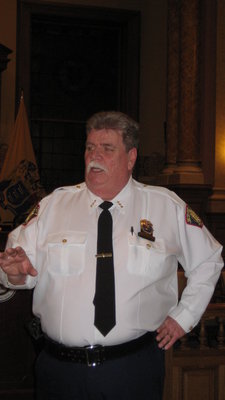For once there was a discussion about crime in Jersey City, but the conversation wasn’t about statistics.
In the first in a series of “town hall” style meetings called by Mayor Jerramiah T. Healy, Jersey City Police Chief Tom Comey led a discussion on Thursday with members of the public regarding what the city and residents can do to reduce crime.
Healy called the meeting after nearly two months of public furor over a string of high-profile crimes captured the public’s attention. Since January several residents have complained about incidents such as a spate of robberies in the Heights, and a recent break-in at a doctor’s office.
These complaints culminated in a heated City Council meeting last month when hundreds of residents railed against the city for not doing more to address crime.
But Thursday’s well-attended discussion at City Hall – which included community members, neighborhood activists, members of the JCPD, the City Council, and Healy – was a calm, solutions-oriented conversation about the problem. Healy and Comey described the measures they are taking to address crime. Comey told residents what they can do to help the police. And residents asked for a stronger police presence on the streets.
City response
Over the last two weeks Mayor Healy has rolled out various changes to the JCPD designed to address crime. Two weeks ago 12 officers were promoted to the level of detective and he has asked Chief Comey to redeploy some officers to areas of the city that are most in need of police presence.
The Jersey City Police force currently has about 802 members, and Comey said he would like to hire another 60 officers. These new hires would help offset the 185 officers who are eligible to retire by July 2013.
Comey said the city has applied for a federal grant that would cover the salaries of these new hires for the first three years of their employment. At the town hall meeting he asked Jersey City residents to lobby their legislators in Washington to help get this grant approved.
Arguing that Jersey City is a “victim of its own success,” and often doesn’t receive federal law enforcement grants because crime here is low for a city of its size, Comey implored the community on Thursday night, “I need your help. Write your congressman. Write your senator. Stop making us pay for our success.”
Several residents applauded the work of the rank-and-file JCPD officers they’ve encountered, but were critical of what they perceive as a lack of street patrols.
“Not a week passes that there isn’t some major incident where I live,” said Jersey City Heights resident Isabella Molnar. “But I never see the police. They’re not there.”
Part of the problem, said retired officer William Breaker, who has worked with Chief Comey, “is that we have a reactionary police force. What we need is a crime prevention force.”
“I think every resident should see an officer on foot or in a car patrol every day,” said Ward C resident John Hanussak.
Many other residents agreed, although most said they specifically wanted to see officers return to foot patrols.
“When Glenn D. Cunningham was mayor, the police walked he streets – and Mayor Cunningham walked with them,” said Ward F resident Virginia Miller. “And that’s what made a difference. There were more foot patrols then.”
“I think every resident should see an officer on foot or in a car patrol every day.” – John Hanussak
¬___________
Dealing drugs on the street
Miller praised police for checking in on workers at a fast food restaurant at Ocean and Bidwell avenues whenever it appears that loiterers are hanging around the store. But too often, she said, she has seen young men shooting craps and dealing drugs while cops in car patrols drive by.
“Everybody knows what they’re doing,” she said. “Everybody knows what’s going on. But the police drive by, they slow down, and they keep going. They need to get out of their cars.”
Comey admitted this is a problem, and not just one rooted in a lack of police personnel.
“You have to change the mindset [of the officers]. And I’m trying to do that. I’m working on it,” he responded to Miller.
The police chief also pointed out that there are several officers who are a presence in the community, but who were working undercover in plain clothes. He said he has recently reassigned more uniformed officers to work in high crime areas to act as deterrent.
To expedite the addition of the 60 officers the JCPD hopes to add to its ranks, Comey said he has already begun the process of filing “Rice applications.” Under the state’s Rice Bill – which was sponsored by State Sen. Ronald Rice (D-Essex) and signed into law in 2010 – police officers who were laid off due to the economy are given first priority when police department vacancies are available around the state. Also, officers who were laid off within their first year of employment are not required to go through the police academy again or retake the civil service exam.
More meetings throughout city
The town hall session Thursday was the first of four such meetings Healy plans to have throughout the city.
“We want to hit all four [police] districts,” said the mayor. “We wanted to respond to what we’ve heard from the community. The police are doing a terrific job and crime has gone down. But if there is a perception problem, and people don’t want to go out of their house at nighttime, we have to do something about that.”
After the meeting ended, several JCPD officers hung around and talked to residents about crime in specific districts and what can be done to improve communication between the department and members of the community.
Comment at www.hudsonreporter.com. E-mail E. Assata Wright at awright@hudsonreporter.com.
